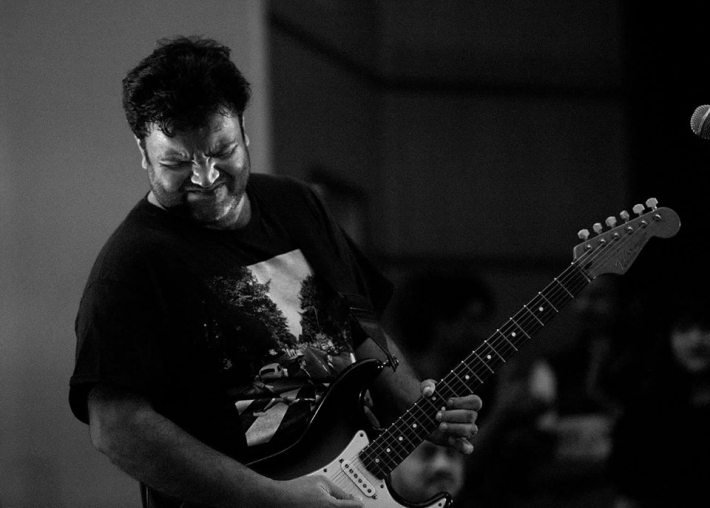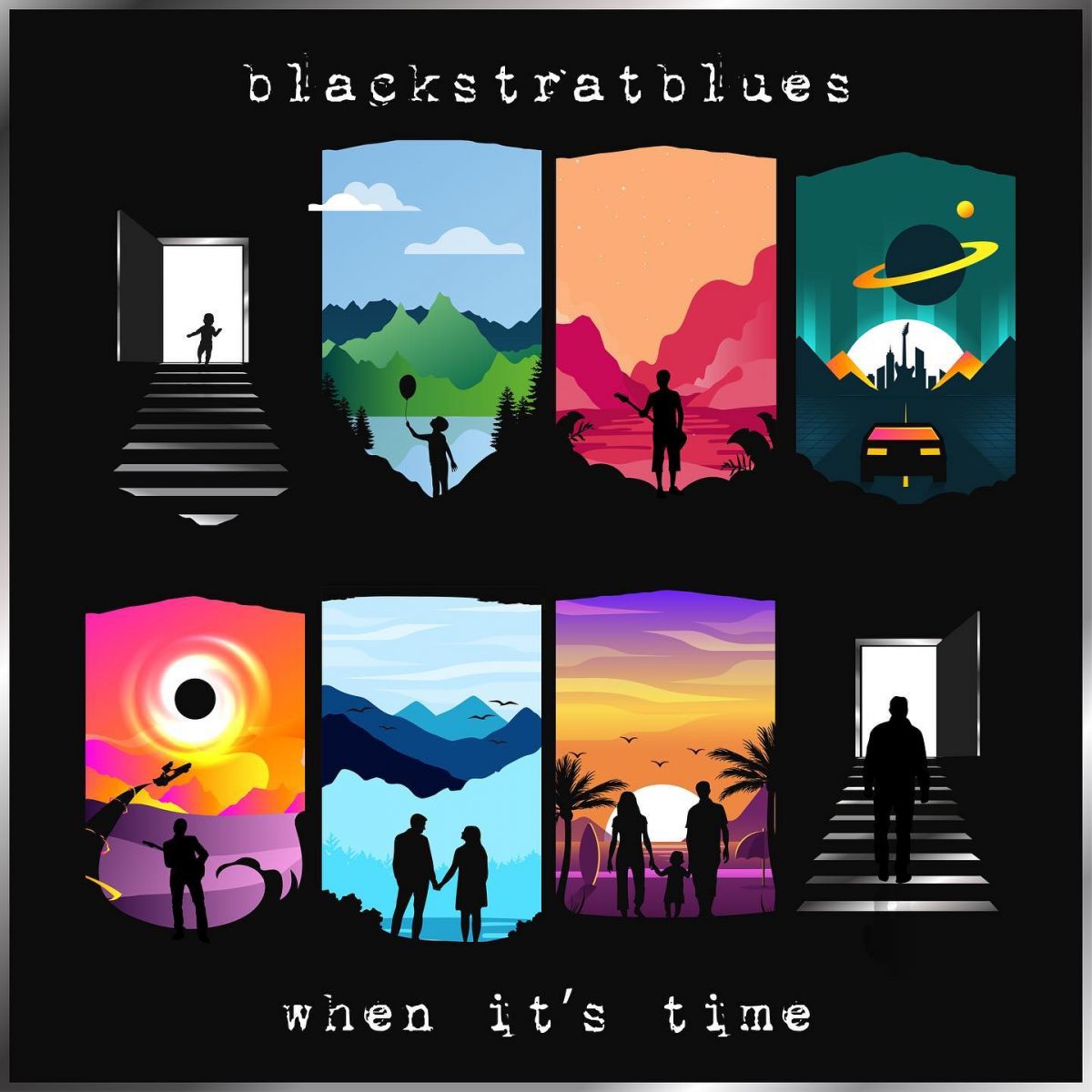

It’s obviously not surprising that Warren Mendonsa and co. are putting out another quality release; he (and they) have been doing this stuff for years. Even the whole oh my god, everyone obviously has their own niche argument is superfluous. This is his third release in the last five years and his previous two albums, ‘The Universe Has A Strange Sense Of Humour’ and ‘The Last Analog Generation’ were both well received, so yes, of course there’s an audience for his music. The best thing about those albums and ‘When It’s Time’ is that they are actively keeping an important place in the modern scene at large. Music has changed drastically over the last few years as it always has, but here Warren and gang sit, making polished and carefully crafted bluesy instrumental music as they always have. Hell yeah.

Yes, yes, the album is excellent. There isn’t much to be said about the personnel on this album that hasn’t already been said; they’re all masters of their instruments. Jai Row Kavi is genuinely otherworldly on the drums; his feel and pocket are on a whole ‘nother planet. Him and Adi Mistry on bass create a rhythm section that, beyond being incredibly tight and nuanced, are an absolutely joy to listen to. There are moments all over the album’s 40 minutes where it sounds like the drums and bass are having a whole conversation while sitting in a groove and driving a track forward. Beven Fonseca’s buttery keys provide further depth; there are some really notable organ (and other) sounds on the album that stay in the back of the mix but give great texture. Warren’s guitars sit comfortably above all this; the ease of listening to the album is partly due to how well-oiled the entire machine is. It’s no secret that his style is what carries the material melodically. The guitars never get caught up in showboating or shredding, instead structuring themselves clearly into lead sections and soloing, a decision that makes the 8 tracks here sound like actual songs instead of noodly snooze-fests. Air guitarists will definitely find ample opportunity to use their skills; there are parts of tracks like ‘Too Cool For Sunday School’ and ‘Looking For Polaris’ that will make you raise your hands and fake-play even if you have no idea what to do with a guitar. But it is the thoughtfulness that has been put into flow and songwriting which really stands out on ‘When It’s Time’.
The eight tracks on this album, while forming a sort of flow and narrative, explore different sonic spaces. So while the whole thing should be listened to as a whole to really enjoy the experience, there are absolutely tracks that different people will return to more on multiple listens.

The loose narrative about family, travel and the really loopy journey through one’s personal growth is something that is much better heard than concretely put into words. But the tracks themselves bear exploring. The album’s opener, ‘Tiny Bit Of Sky’, starts with a voice sample of Warren’s daughter, and it sounds like a sort of lullaby for her (which he has said was the sonic inspiration for the piece). It’s fairly easygoing, and the Rhodes-y keys in the back are awesome. The song never really takes off anywhere, but if you’re putting someone to sleep, it shouldn’t. ‘Happy E Friends’ is a tiny bit more dynamic and feisty. Jai and Adi do a lot with a little rhythmically and the song shifts between sections with so much ease you barely notice. There is also what sounds like a jangly acoustic guitar sort of sound supporting certain sections (like what you’d hear on an old 70s record that had a 12-string on it); this sound pops up a lot throughout the album. Warren’s guitars are throaty and chock-full of personality. This comes to the fore towards the end of the track, where he keeps things restrained but puts a lot into his playing. It’s almost like the band thinks of letting loose, but elects not to. On ‘Too Cool For Sunday School’, they do; it’s probably the most straight blues track on here. Even though the modest shuffle that starts the track off is sort of held back, once the beat switch happens towards the last third, everyone really goes for it. The album takes a bit of a turn at this point. ‘Interstellar Roadtrip’ is a detour through early prog and the type of story-centered stuff bands were doing in the 70s and early 80s. The groove is much more of a driving force here and this time some killer basslines by Warren. The track goes through a few transitions and passages in a flurry, almost like there are so many ideas to get to that there’s no time to waste dwelling on one motif. ‘Black Hole x3’ is the most in-your-face track on ‘When It’s Time’. It’s pretty much five and a half minutes of straight riffage, and Beven’s organs come to the fore here; they sound fantastic at the points where they double up the guitar melody. This is probably the most accessible track on the album for uninitiated ears; some of the chord selections are just the right amount of dark for the hulking riffs to work. ‘Looking For Polaris’ is another trip through blues-and-shred land. It’s a bit more uppity than the earlier ballad-type tracks on the albums, but it sort of does the same job. The section at the three-minute mark is what turns the track around; a riff suddenly kicks you in the face and Warren proceeds to play the kind of solo that makes you shake your head vigorously. But the real highlight of the album is ‘Little Castles’. It’s a short 2-minute piece with no drums. The jangly acoustic sound provides the background, there is some bass and percussion, and Warren’s guitar is almost weeping. The song has the sort of gothic darkness and loneliness that some of Steven Wilson’s solo work has (people familiar will also recognize the sonic palate used here), and it really hits hard. The song also has some of the most emotive playing on the whole album; it sounds like a children’s story gone wrong. The album ends with the title track, which is a bit long-winded but has enough big-ticket moments to leave thrill-seekers satisfied.
Not only is it nice to have such a high-quality album come out that is so well-written and fun to listen to, it also gives us the belief that instruments are still a viable way to make emotive, modern music. Even though the idea of a blues-centered instrumental band is not the most cutting edge thing in the world, very little about ‘When It’s Time’ sounds dated or old. It sounds good. That’s what’s important.
Listen to When It's Time
Previous Article The New Visita EP Is A Safe Space The New Visita EP Is A Safe Space
|
Next Article Sandunes Bring Organic Warmth To Sample-Based Electronic Music On New EP Sandunes Bring Organic Warmth To Sample-Based Electronic Music On New EP
|
A sense of both comfort and resolution pervades “Chronicles: Consolation”, but that’s by design




Leave a comment